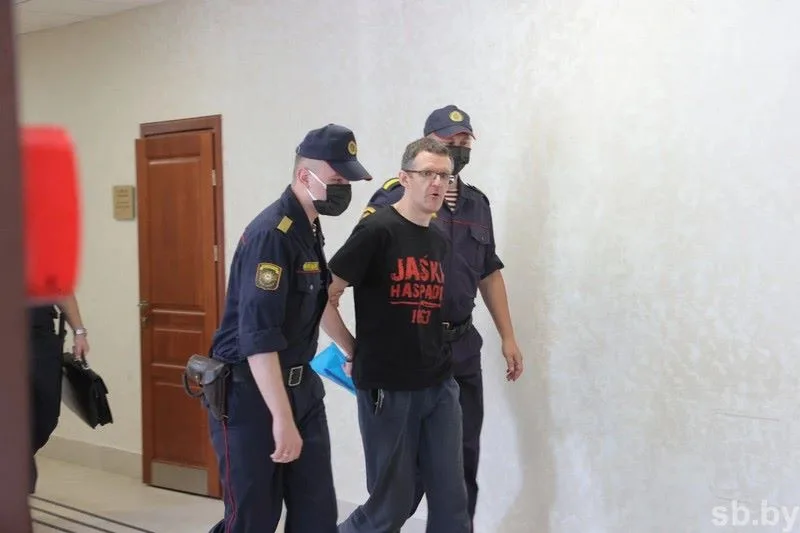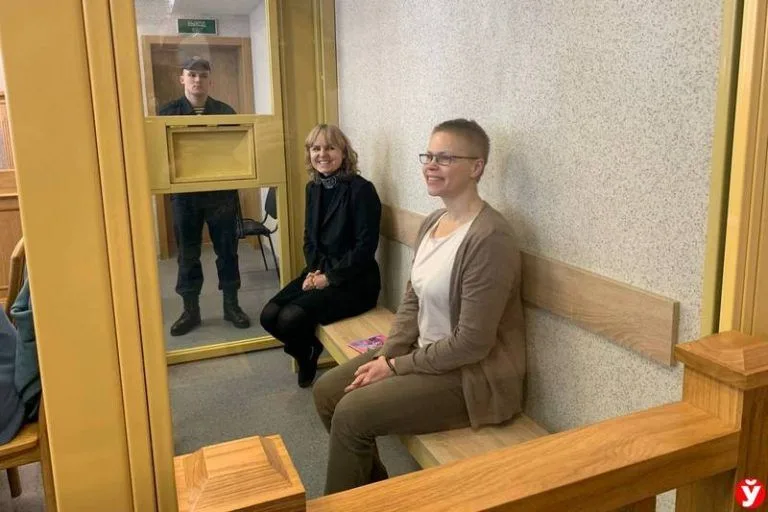Where are they now?
Remembering persecuted colleagues from the Belarus Association of Journalists in dire need of support.

Over the course of more than a decade, I worked with independent journalists in Belarus to help build their organisational and journalistic skills, as part of an International Federation of Journalists project funded by International Media Support.
My first task had been to edit a booklet about BAJ, including details of the murders of journalists Dzmitry Zavaski in July 2000 and Vieranika Charkasava (pictured on the cover) in October 2004, and the beatings, arrests and jailings of some 50 local and international media workers covering the 2006 Presidential elections in Minsk.
Today most of the people I worked with are now either in jail or in exile.
After years of persecution under President Lukashenka, whom even Condoleezza Rice dubbed ‘the last dictator in Europe’, the multi award winning Belarusian Association of Journalists <www.baj.media> was liquidated under a Supreme Court order in 2021. The homes of BAJ leaders were raided, and the BAJ office broken into and sealed by the security forces. (I wonder if the bell I brought them from the Whitechapel Bell Foundry is still locked inside.)
As if that was not enough, in 2023 the Belarusian KGB added insult to injury by declaring BAJ an extremist organisation.
I had my own brushes with the KGB on only my second visit to Belarus. They seemed to know where I was at all times. Although visa regulations required you to stay where you say you are staying, in Minsk, I went with a team of BAJ members to meet colleagues who were keeping independent journalism alive in towns around the country.
We had to reschedule some meetings as calls came in from the KGB – who frequently rang working journalists just to keep them in their place. They were letting us know they knew where we were. This time they informed us the editor of the local paper in a particular industrial centre would like to interview me.
We turned up at her empty offices late on a Saturday afternoon. She introduced us to ‘trainee reporter’ who wanted to sit in on the interview. She blew the gaffe on the set up with her first question by asking me to “describe media regulation in your home country of Ireland”. Now I am an Irish citizen and travel on an Irish passport, but I was born and live in England. The only way she could know about my Irish connection would have been through official sources.
The ‘trainee’ punched another hole in the scam with the only two questions he asked – for my views on Latvia removing Russian statues from public parks, and the West’s recognition of Kosovo. I respectfully pointed out that these were political matters on which I would not comment, but I was happy to answer questions on journalism issues. He had none. The editor continued her interview with carefully prepared questions she appeared to be reading from a Filofax. We left soon after, but not before I snapped a picture of the hapless pair. He turned out to be a local KGB agent. I never saw what she wrote in a two-page spread based on our interview, but it was sufficient to get me banned from Belarus for a decade.
BAJ members had their own hair-raising tales of KGB interference including a young blogger who was detained merely for posting pictures of ‘Press Freedom Teddy bears’ that had landed in his girlfriend’s garden outside Minsk. They had been dropped from a plane by Swedish activist Tomas Mazetti. And everywhere there was concern about the bugging of locations and landline phones. Internet cafe owners were obliged to report on which sites their customers accessed.
It made me realise that the mysterious disappearance of my boarding card at Gatwick Airport, which meant I had to identify myself to a state official on the aircraft, an attempt to rook me by officials at Minsk airport, and the theft of my wallet from a state hotel and its miraculous reappearance, sans cash, but after I had cancelled all my cards, might all have been part of a destabilising tactic.
The KGB make no secret of their presence operating from a massive yellow headquarters consuming a whole block, complete with cells and interrogation suites, right in the centre of Minsk. And when opposition candidate Alyaksandr Kazulin was briefly released from jail in 2008 to attend the funeral of his wife, the church and the streets outside were so full KGB that it was risky to take photos. Kazulin had been jailed for more than 5 years for organising anti-government rallies.
Even my ban did not put a stop to our training programme. We held sessions in Latvia, Lithuania, Poland, Russia and Ukraine instead. At one of them several young members came out as gay, and I was proud to have been part of the creation of an LGBTQ+ network across the region. Christmas 2024 sees Journalists 4 Tolerance celebrating its 15th anniversary.

Denis Ivashin is led away to serve 9 years for investigating the recruitment of former Ukrainian riot squad members into the Belarusian police force
So many of these brave journalists were taking risks with their freedom. The entire BAJ Executive is now in exile, with at least 45 media workers currently in jail serving sentences from two to 14 years.
Andrei Aliaksandrau was part of a BAJ delegation to Britain and spent several years in the UK, working with Index on Censorship and Amnesty. He and his partner Iryna Ziobina were arrested in January 2021 charged with rioting, and accused of paying the fines and detention fees of anti-government protestors.

Later charged with high treason Andrei was sentenced to 14 years in gaol, Iryna got 9 years. The couple married in Minsk jail in 2022.
By declaring publications and broadcasting outlets ‘extremist formations’ the authorities are able to arrest and charge photographers, camera operators and other freelancers just for supplying material to outlets. While I was there anyone publishing more than 300 copies had to be registered and comply with any regulations the state might impose. You even needed official permission to sell in the street. I was told a favourite trick of the security services was to approach someone carrying newspapers and ask to buy one, then arrest anyone who obliged. Some newspapers had to be printed outside the country so delivery was fraught with added dangers. And one newspaper office I visited was subsequently bought by the local authority which promptly evicted the paper. Without a proper office as stipulated by the state, it became an illegitimate operation.

When TUT.BY Media was ’liquidated’ by the state in 2021, editor-in-chief Maryna Zolatava and her CEO Ludmila Chekhina were jailed for 12 years each on charges that ranged from tax evasion to associating with terrorists. Three other staff members cited as co-defendants went on the run and are now listed as fugitives wanted by the Lukashenko regime.
Putin-fan Alexander Lukashenko has been in power since 1994. In the unfree and unfair presidential elections of 2020 he claimed 80% of the vote which was odd as opposition candidate Sviatlana Tsikhanouskaya reckoned she had won 60%. Inevitably she is now in exile along with those close colleagues who did not end up in jail. Sergei, her blogger husband, had been the original candidate but his candidacy was blocked as he had earlier been jailed for ‘participating in an unauthorised protest action’. Sviatlana took his place. She intends to run again in the summer of 2025 when Lukashenko will be seeking his seventh term in office.
When Thatcher’s favourite PR-man Tim Bell was burnishing President Lukashenko’s image in 2008, I produced Zvon (The Belarus Clarion) a 4‑page newsletter telling the truth about the repressive regime. Exiled journalists distributed it to investors at a Church House event in Westminster. British security services officers asked us to move away, at the behest of their KGB counterparts. We were back to picket Bell’s Dorchester Hotel dinner party in Park Lane that evening.
Amnesty international, Index on Censorship and the exiled Belarus Free Theatre are leading support for BAJ members in the UK. Funds are needed to keep spirits high and look after the families of those in jail. Donations can be sent via https://www.patreon.com/baj_media
PHOTOS: BAJ & Mike Jempson
 @bajmedia
@bajmedia
